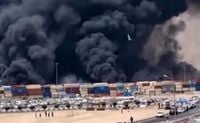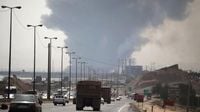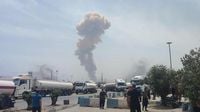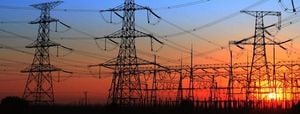A massive explosion rocked the Iranian port city of Bandar Abbas on Saturday, April 26, 2025, resulting in at least five fatalities and injuring over 700 individuals, according to state media reports. The blast occurred at the Shahid Rajaei port, sending a towering plume of black smoke into the sky that could be seen from a distance. Eyewitness accounts described the explosion as powerful enough to be felt and heard up to 50 kilometers away, shaking buildings and shattering windows in the surrounding area.
Mehrdad Hassanzadeh, head of the Hormozgan province's crisis management authority, confirmed on state television that the explosion was caused by the detonation of several containers stored in the wharf area of the port. "We are currently evacuating and transporting the injured to nearby medical centers," he stated, as emergency responders rushed to the scene.
The explosion occurred during a critical time for Iran, coinciding with the third round of nuclear negotiations between Iranian and U.S. officials taking place in Oman. While authorities have not established a definitive cause for the explosion, initial reports suggest it may be linked to improperly stored chemicals. A spokesperson for Iran's emergency services indicated that the blast was likely associated with chemicals being stored in a warehouse at the port.
Videos circulating on social media captured the moment of the explosion, showing thick clouds of smoke billowing from the port area. Some footage depicted helicopters dropping water on the ignited fire, while debris was scattered across a wide area, damaging numerous port facilities. Local authorities indicated that the port had been closed, and maritime operations were suspended in the aftermath of the explosion.
Iranian President Masoud Pezeshkian ordered an investigation into the incident, emphasizing the need to determine the exact cause of the explosion. A government spokeswoman, Fatemeh Mohajerani, stated that it would take time to ascertain the cause but noted that containers likely containing chemicals were stored in a corner of the port. She added, "Until the fire is extinguished, it’s hard to ascertain the cause."
The Shahid Rajaei port is a crucial hub for container traffic, handling approximately 70 million tons of cargo annually, including oil and general shipping. Covering an area of 2,400 hectares, the port features nearly 500,000 square meters of warehouse space and 35 shipping berths. Despite its significance, the port has faced challenges in the past, including a cyberattack in 2020 that targeted its operations.
As rescue teams worked tirelessly to evacuate the injured and contain the fire, reports emerged that some individuals may have been trapped in the wreckage of collapsed buildings. The Iranian Red Crescent Society dispatched four rapid response teams to assist at the scene, and injured individuals were immediately transferred to hospitals in the region. Eyewitnesses reported that the blast caused extensive damage, with windows blown out within several kilometers of the explosion's epicenter.
While the explosion has raised concerns regarding safety protocols at the port, it has also sparked speculation about potential sabotage, given the ongoing tensions between Iran and its adversaries. Iranian Foreign Minister Abbas Araghchi acknowledged the heightened security concerns, stating, "Our security services are on high alert given past instances of attempted sabotage and assassination operations designed to provoke a legitimate response."
Despite the speculation, the Israel Defense Forces (IDF) denied any involvement in the explosion, which occurred near an Islamic Revolutionary Guard Corps (IRGC) naval base. The National Iranian Oil Products Distribution Company clarified that the explosion had no connection to its refineries, fuel tanks, or oil pipelines, asserting that operations at its facilities continued without interruption.
The incident at Shahid Rajaei port has drawn attention not only for its immediate impact but also for its potential implications on Iran's nuclear negotiations with the United States. As the talks aim to address concerns over Iran's nuclear program, the explosion adds another layer of complexity to an already tense diplomatic landscape.
With investigations underway and the full extent of the damage still being assessed, the people of Bandar Abbas and the broader Iranian community are left grappling with the aftermath of this tragic event. President Pezeshkian expressed his condolences to the victims' families and emphasized the importance of ensuring safety measures to prevent such incidents in the future.






